Charles E W Bean, Diaries, AWM38 3DRL 606/36/1 - December 1915 - January 1916 - Part 8
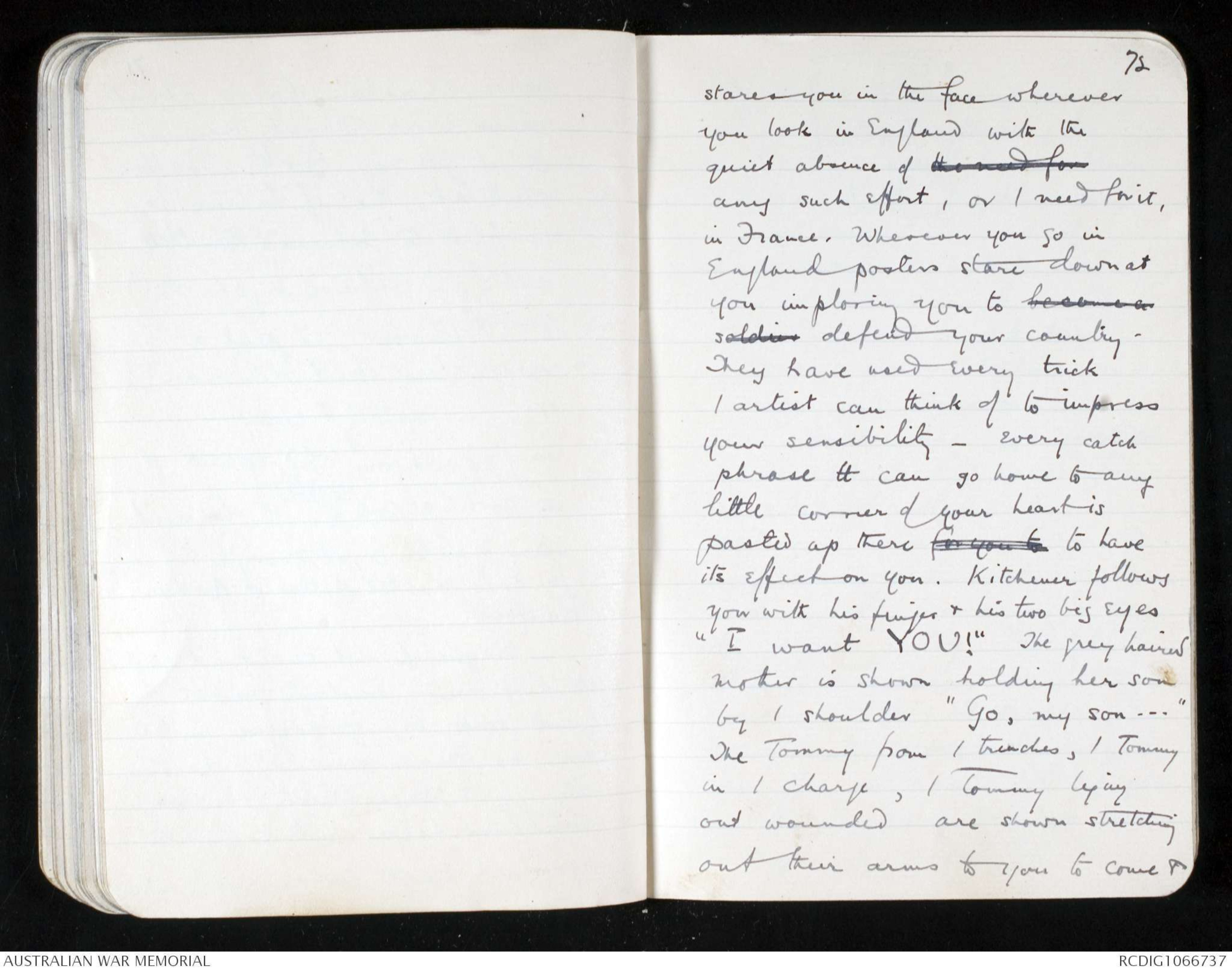
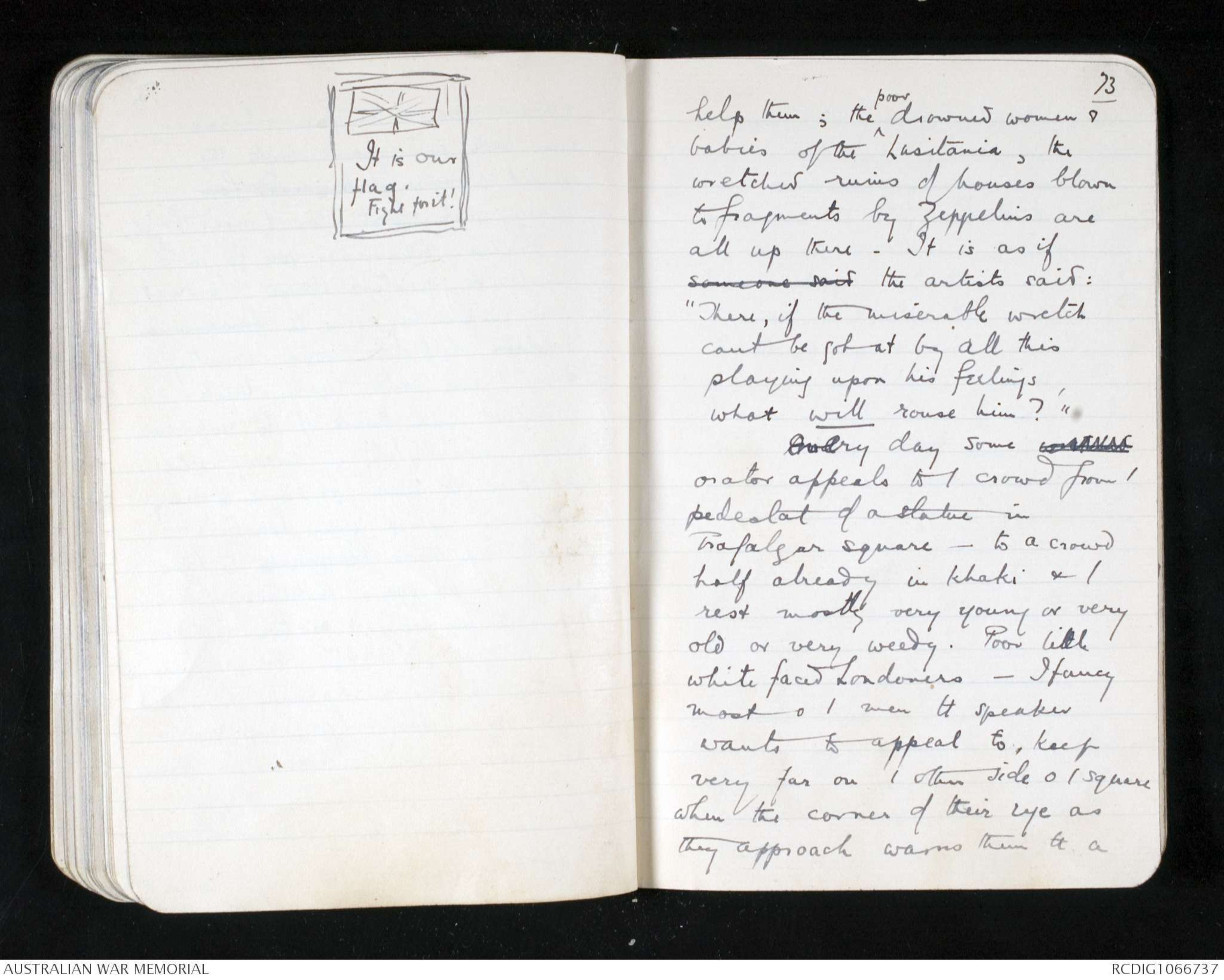
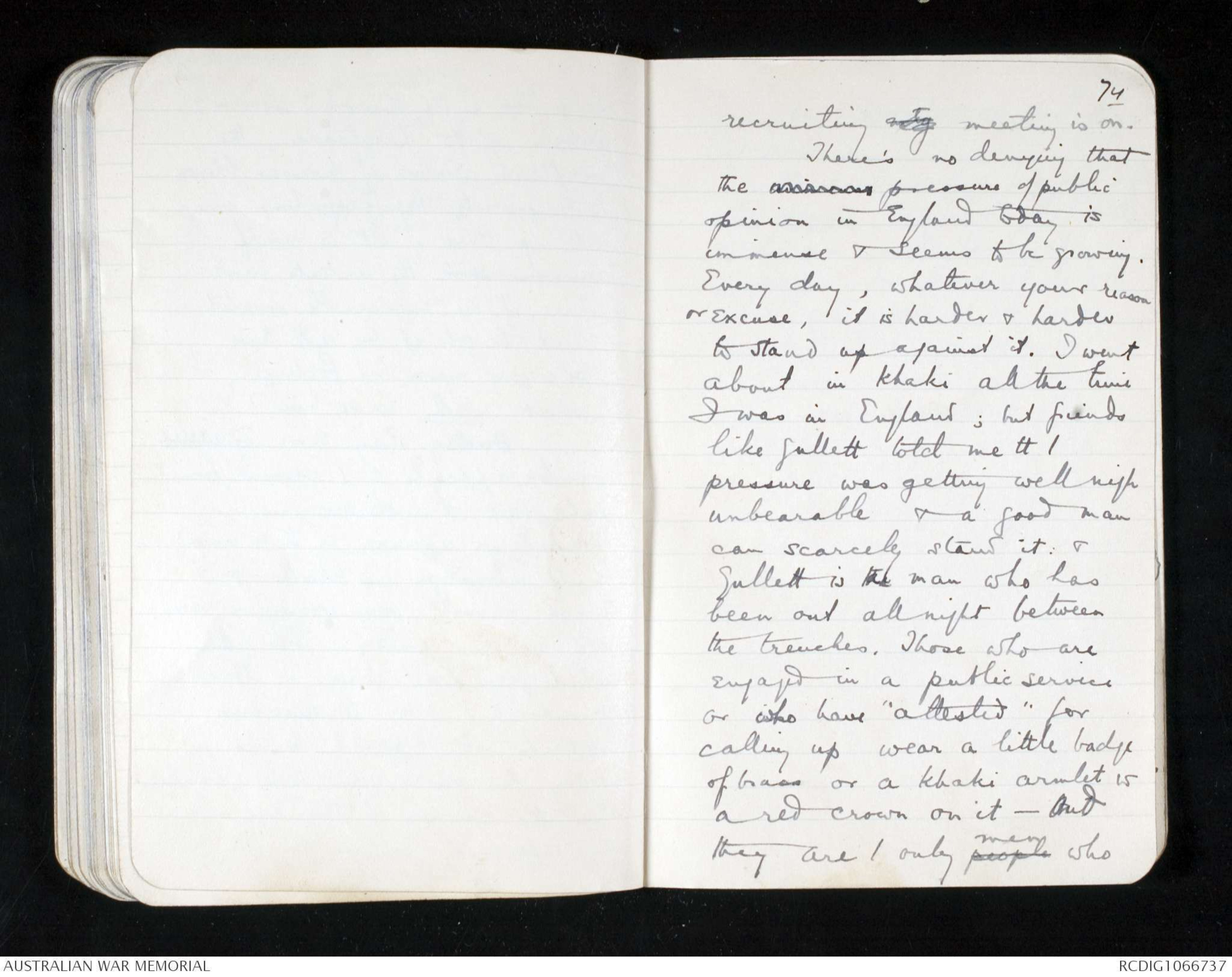
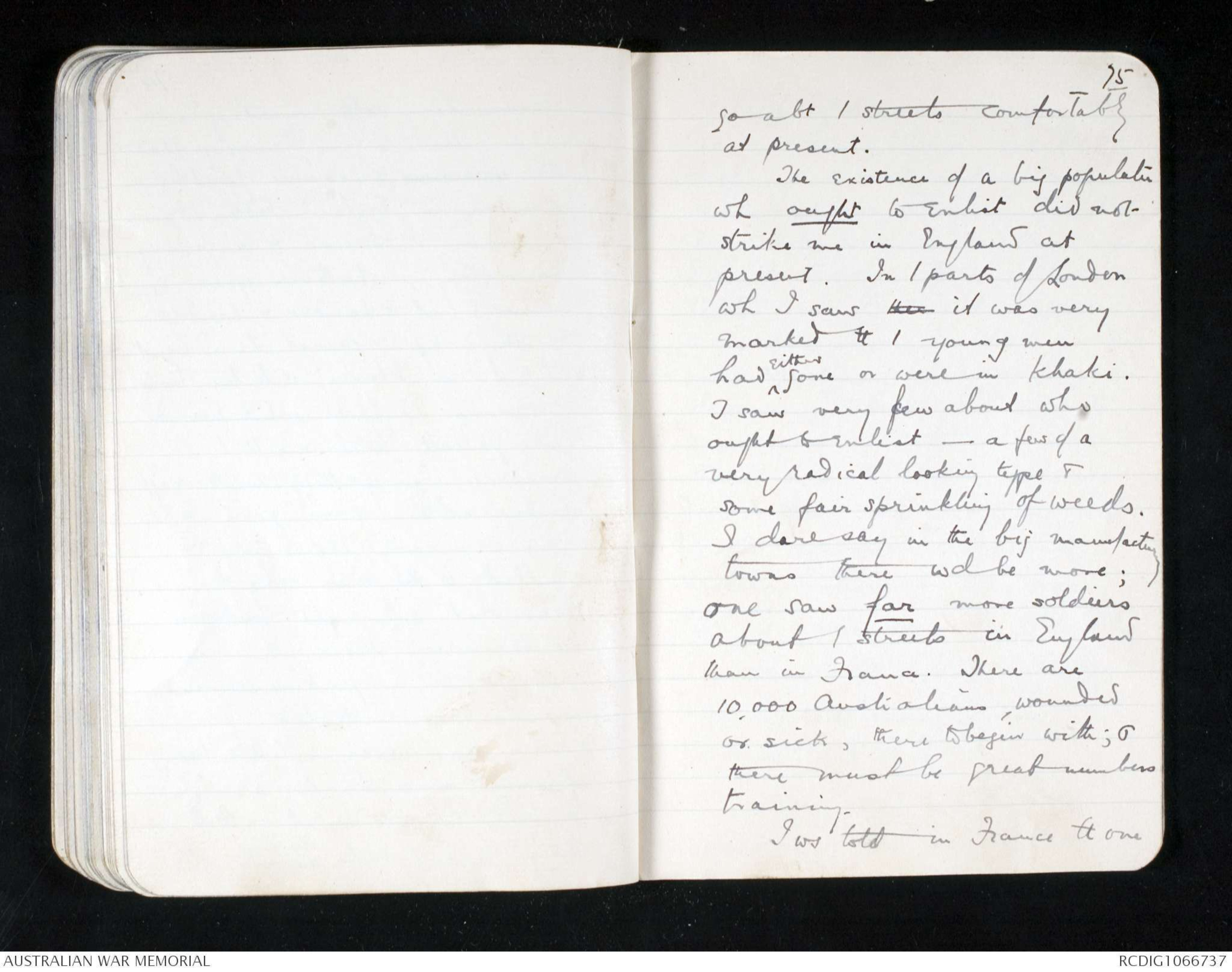
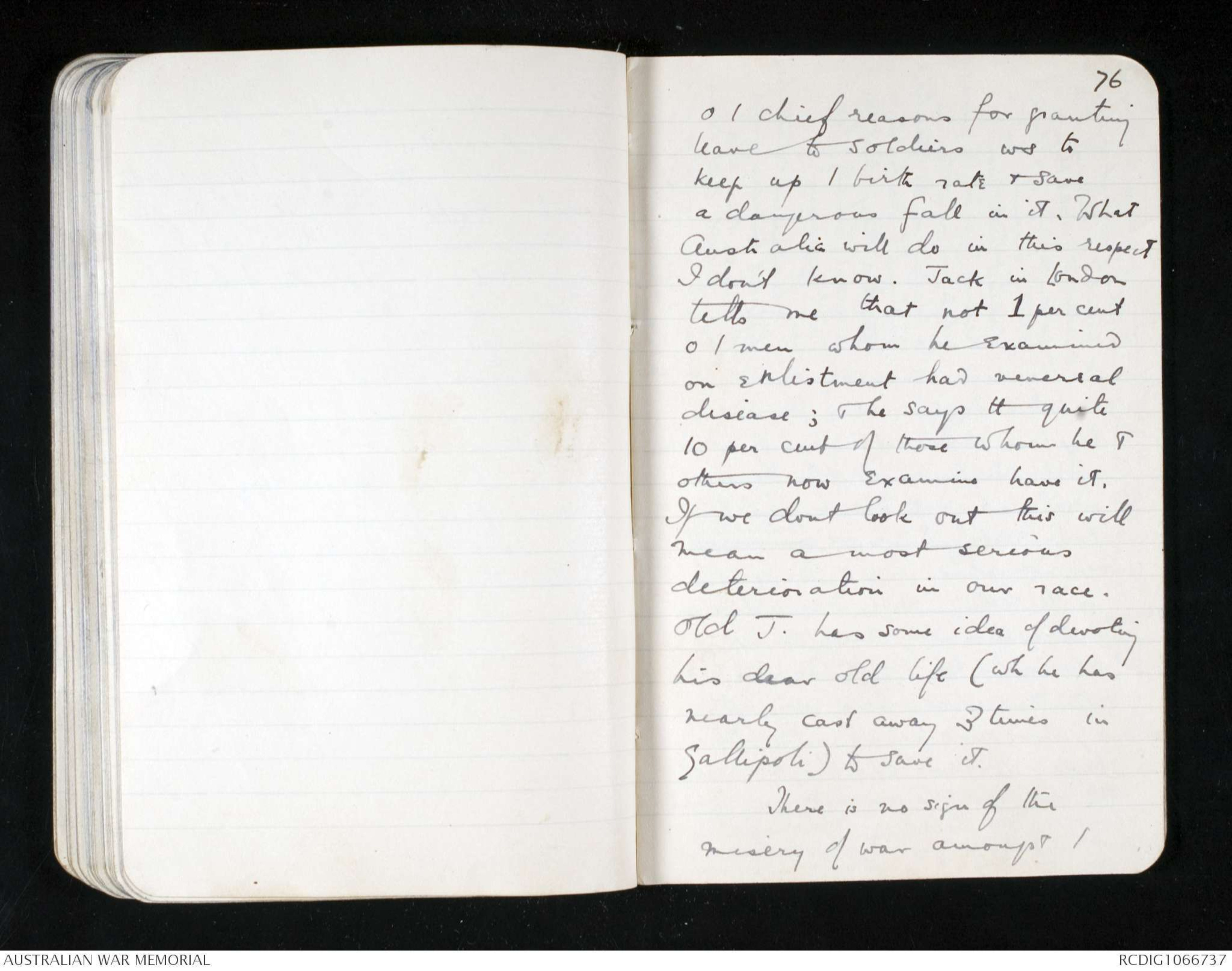
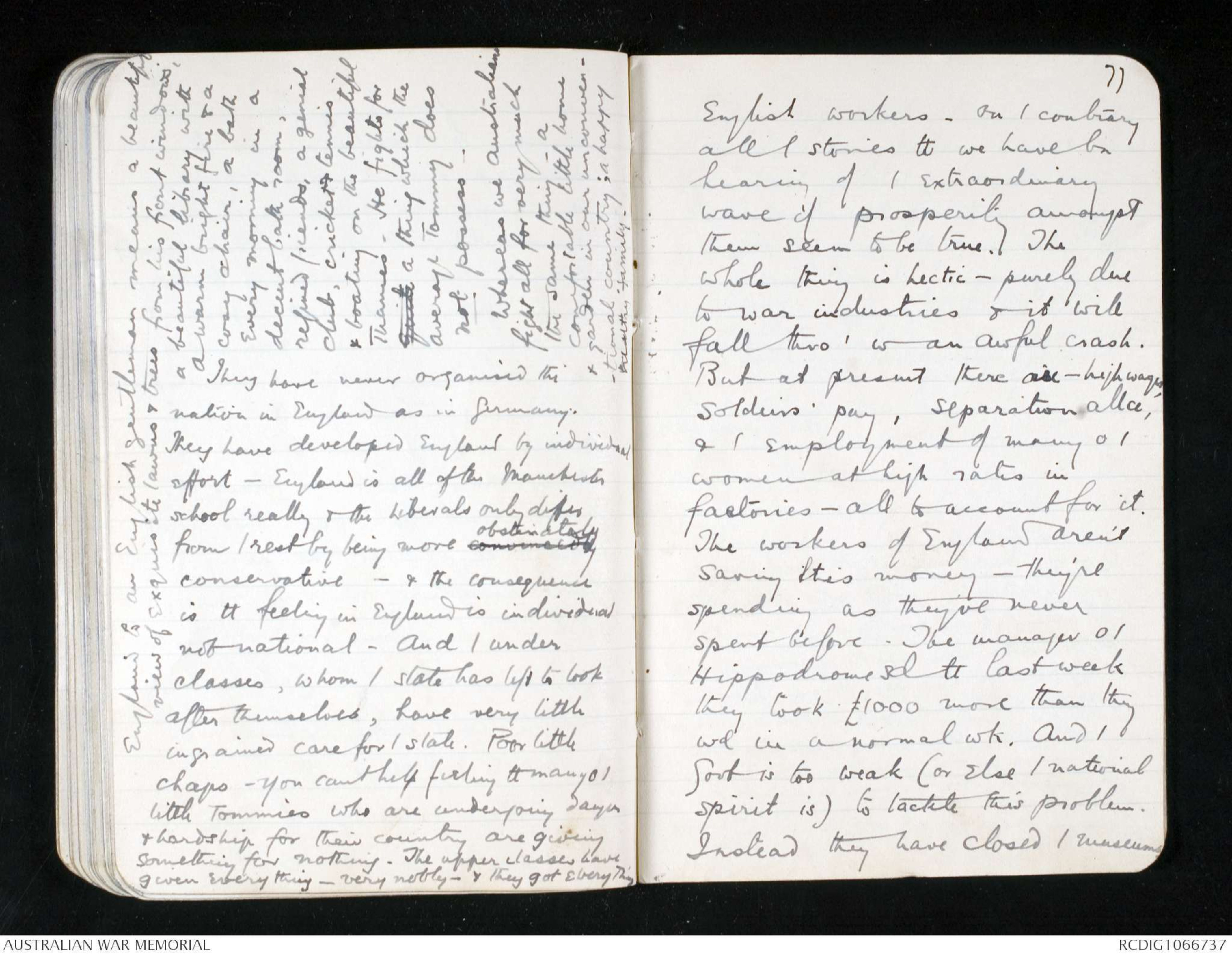
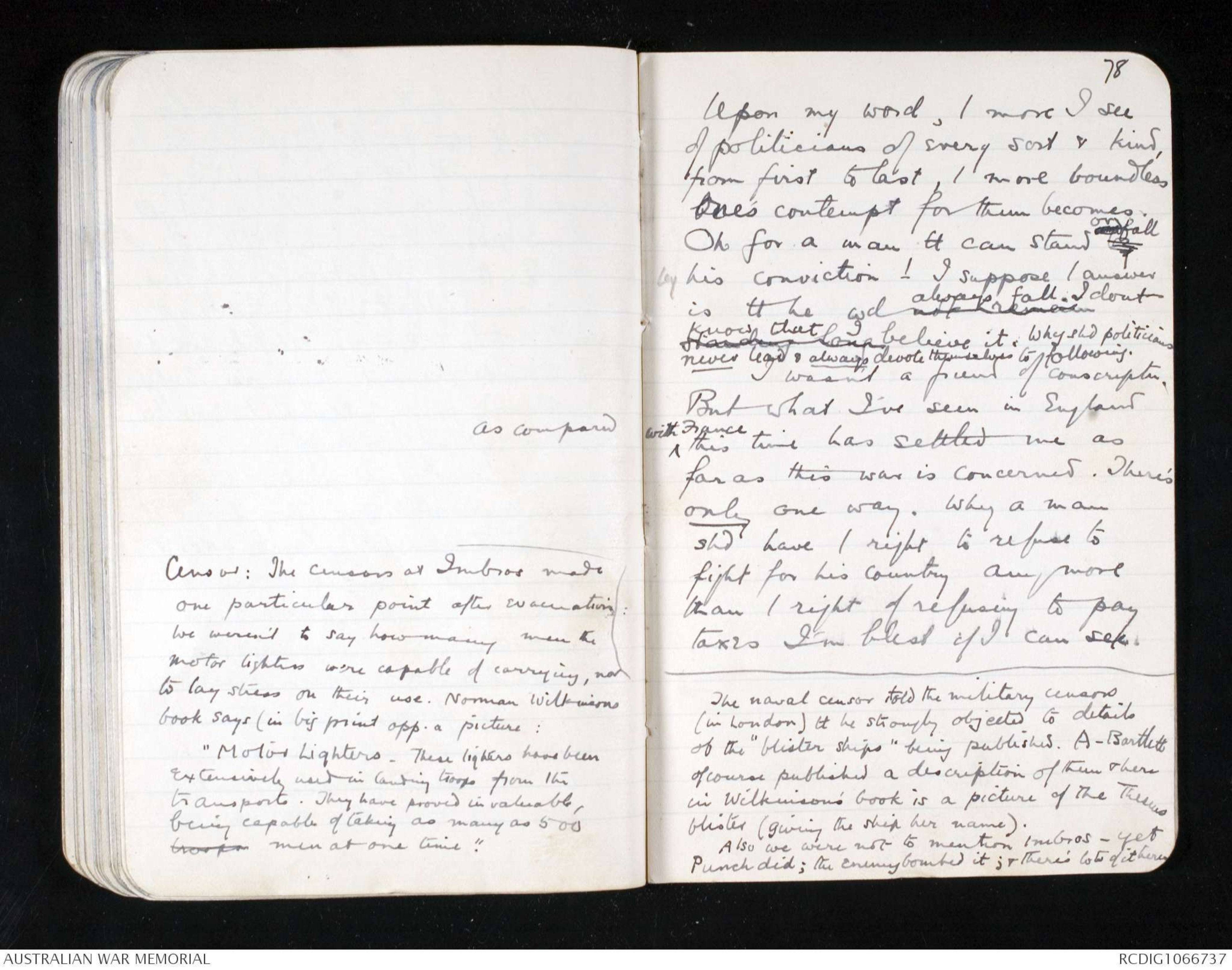
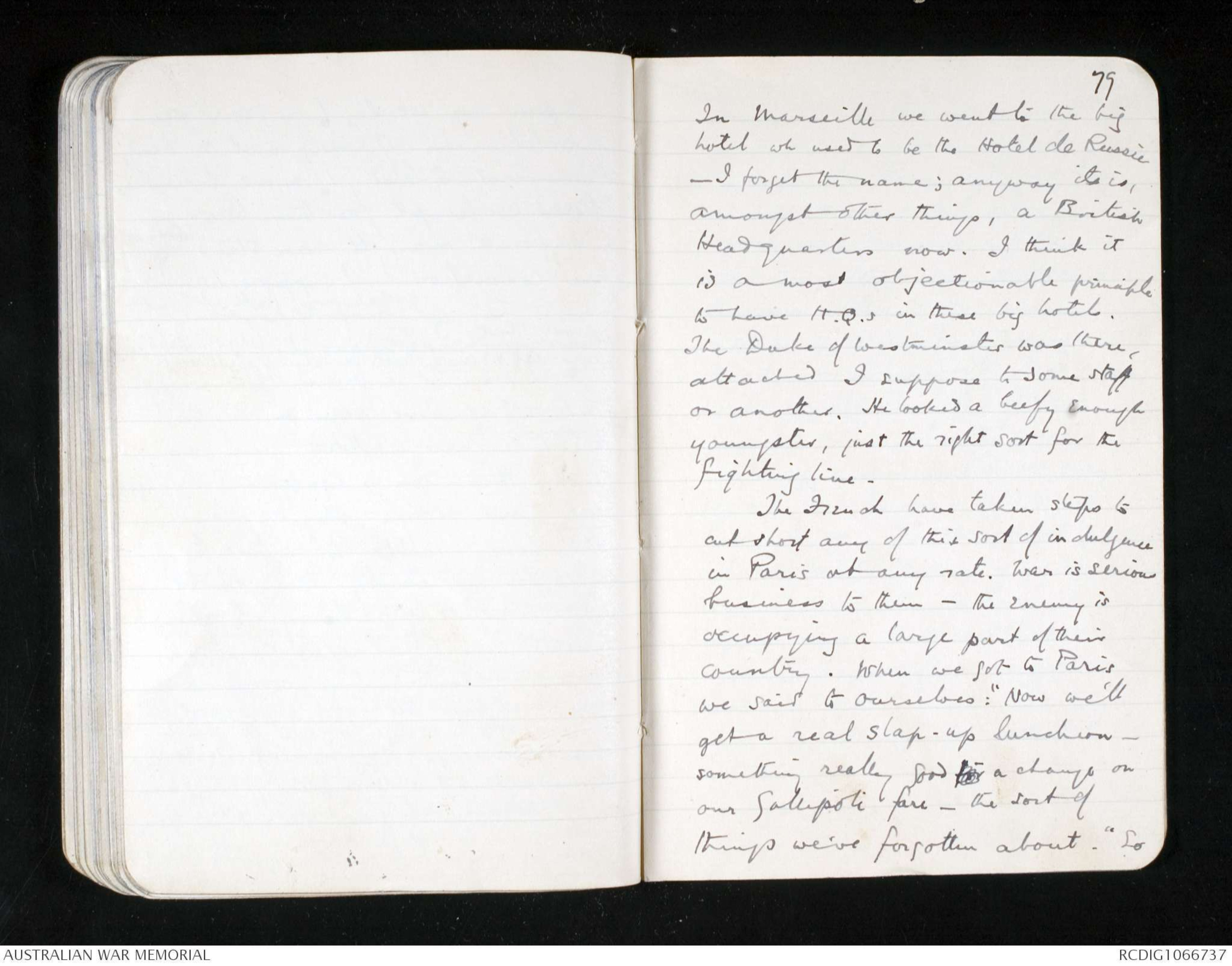
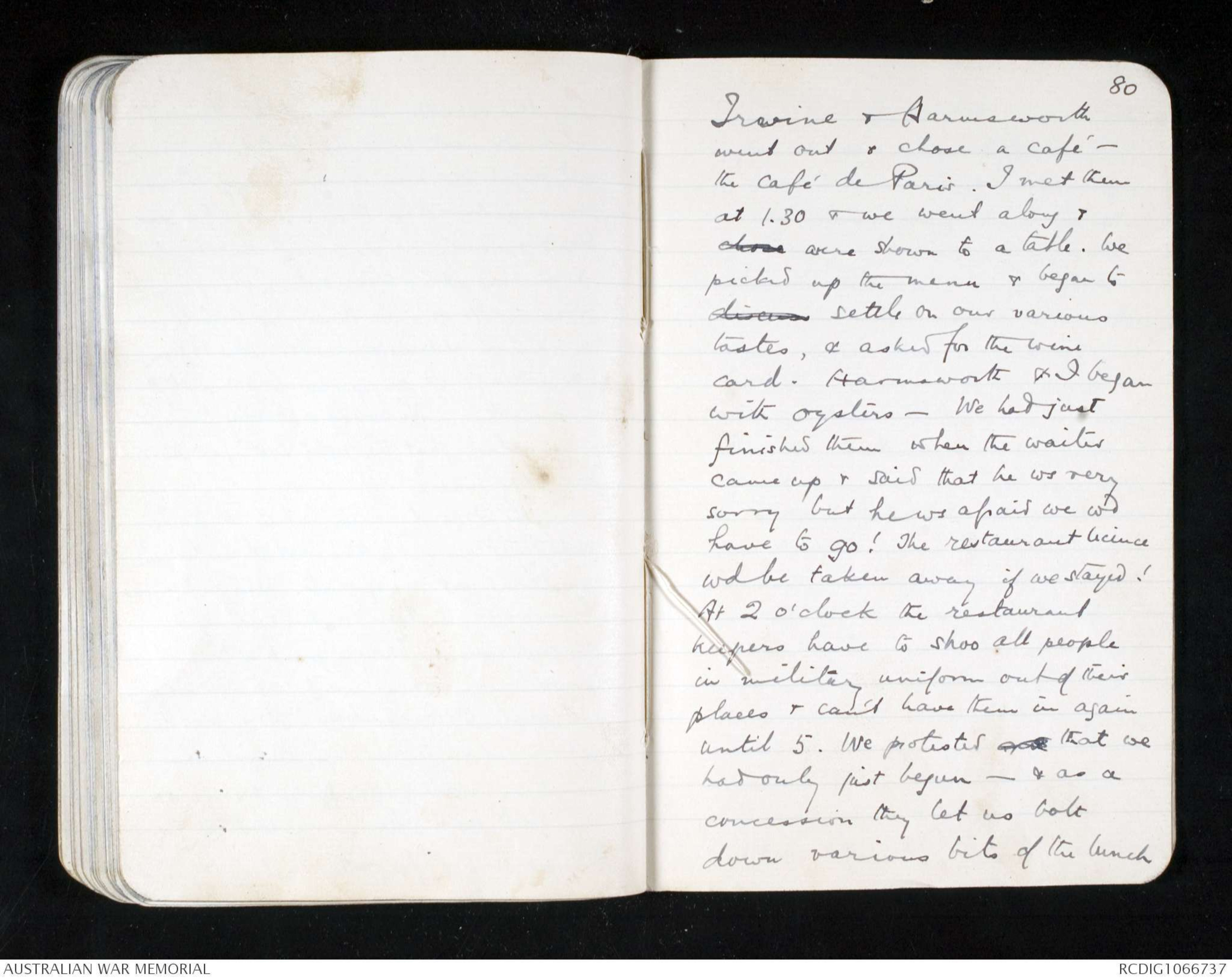
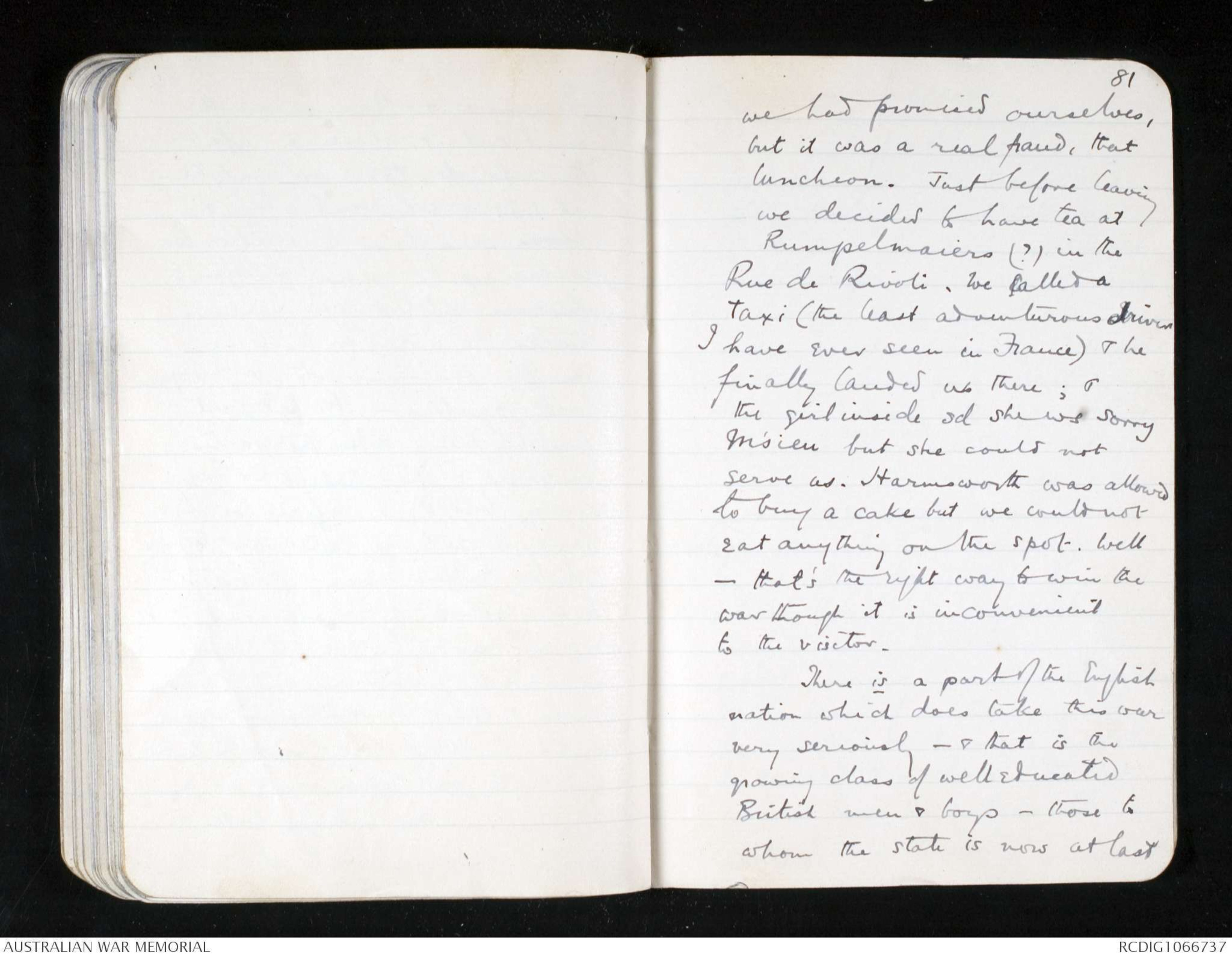
72
stares you in the face wherever
you look in England with the
quiet absence of the need for
any such effort, or / need for it,
in France. Wherever you go in
England posters stare down at
you imploring you to become asoldier defend your country.
They have used every trick
/ artist can think of to impress
your sensibility - every catch
phrase tt can go home to any
little corner of your heart is
pasted up there for you to to have
its effect on you. Kitchener follows
you with his finger & his two big eyes
“I want YOU!” The grey haired
mother is shown holding her son
by / shoulder “Go, my son…”
The Tommy from / trenches, / Tommy
in / charge, / Tommy lying
out wounded are shown stretching
out their arms to you to come &
Diagram - see original
73
help them; the ^poor drowned women &
babies of the Lusitania, the
wretched ruins of houses blown
to fragments by Zeppelins are
all up there. It is as if someone said the artist said:
"There, if the miserable wretch
can’t be got at by all this
playing on his feelings,
what will rouse him?”
Every day some xxxx
orator appeals to / crowd from /
pedestal of a statue in
Trafalgar Square - to a crowd
half already in khaki & /
rest mostly very young or very
old or very weedy. Poor little
white faced Londoners - I fancy
most o / men tt speaker
wants to appeal to, keep
very far on / other side o / square
when the corner of their eye as
they approach warns them tt a
74
recruiting mtg meeting is on.
There’s no denying that
the xxxxxx pressure of public
opinion in England today is
immense & seems to be growing.
Every day, whatever your reason
or excuse, it is harder & harder
to stand up against it. I went
about in khaki all the time
I was in England; but friends
like Gullet told me tt /
pressure was getting well nigh
unbearable & a good man
can scarcely stand it: &
Gullet is the man who has
been out all night between
the trenches. Those who are
engaged in a public service
or who have “attested” for
calling up wear a little badge
of brass or a khaki armlet w
a red crown on it - and
they are / only people men who
75
go abt / streets comfortably
at present.
The existence of a big populatn
wh ought to enlist did not
strike me in England
at present. In / parts of London
wh I saw ther it was very
marked tt / young men
had ^either gone or were in khaki.
I saw very few about who
ought to enlist - a few of a
very radical looking type &
some fair sprinkling of weeds.
I daresay in the big manufacturing
towns there would be more;
one saw far more soldiers
about / streets in England
than in France. There are
10,000 Australians wounded
or sick, there to begin with; &
there must be great numbers
training.
I was told in France tt one
76
o / chief reasons for granting
leave to soldiers ws to
keep up / birth rate & save
a dangerous fall in it. What
Australia will do in this respect
I don’t know. Jack in London
tells me that not 1 per cent
of men whom he examined
on enlistment had venereal
disease; & he says tt quite
10 per cent of those whom he &
others now examine have it.
If we don’t look out this will
mean a most serious
deterioration in our race.
Old J. has some idea of devoting
his dear old life (wh he has
nearly cast away 3 times in
Gallipoli) to save it.
There is no sign of the
misery of war amongst /
[*England to our English gentleman
means a beautiful
view of exquisite lawns
& trees from his front windows,
a beautiful library with
a warm bright fire & a
cosy chair, a bath
every morning in a
decent bath room,
refined friends, a genial
club, cricket & tennis
& boating on the beautiful
Thames - he fights forquite a thing which the
average Tommy does
not possess.
Whereas we Australians
fight all for very much
the same thing - a
comfortable little home
& garden in our
unconventional country; happy
healthy family.*]
They have never organised the
nation in England as in Germany.
They have developed England by individual
effort - England is all of the Manchester
school really & the Liberals only differ
from / rest by being more convincedly obstinately
conservative - & the consequence
is tt feeling in England Is individual
not national - And / under
classes, whom / state has left to look
after themselves, have very little
ingrained care for / state. Poor little
chaps - you can’t help feeling tt many o /
little Tommies who are undergoing danger
& hardship for their country are giving
something for nothing. The upper classes have
given everything - very nobly - & they got everything.
77
English workers - on / contrary
all / stories tt we have bn
hearing of / extraordinary
wave of prosperity amongst
them seem to be true. The
whole thing is hectic - purely due
to war industries & it will
fall thro' w an awful crash.
But at present there are - high wages,
soldiers' pay, separation allce
& / employment of many o /
women at high rates in
factories - all to account for it.
The workers of England aren’t
saving this money - they're
spending as they've never
spent before. The manager o /
Hippodrome sd tt last week
they took £1000 more than they
wd in a normal week. And /
Govt is too weak (or else / national
spirit is) to tackle this problem.
Instead they have closed / museums.
Censor: The censors at Imbros made
one particular point after evacuation.
We weren’t to say how many men the
motor lighters were capable of carrying nor
to lay stress on their use. Norman Wilkinson’s
book says (in big print opp. a picture:
“Motor Lighters. These lighters have been
extensively used in landing troops from the
transports. They have proved invaluable,
being capable of taking as many as 500troops men at one time.” →
78
Upon my word, / more I see
of politicians of every sort & kind,
from first to last, / more boundless
one's contempt for them becomes.
Oh for a man who can stand by or fall
by his conviction! I suppose / answer
is tt he wd always fall not remain. I don’t standing long know that I believe it. Why shd politicians
never lead and always devote themselves to following.
I wasn’t a friend of conscripn,
But what I’ve seen in England
[*as compared*] ^with France this time has settled me as
far as this war is concerned. There’s
only one way. Why a man
shd have / right to refuse to
fight for his country anymore
than / right of refusing to pay
taxes I’m blest if I can see.
-----
The naval censor told the military censors
(in London) tt he strongly objected to details
of the “blister ships” being published. A-Bartlett
of course published a description of them & here
in Wilkinson’s book is a picture of the Theseus
blister (giving the ship her name).
Also we were not to mention Imbros - yet
Punch did; the enemy bombed it; & there's lots of it here
79
In Marseille we went to the big
hotel wh used to be Hotel de Russie,
- I forget the name; anyway it is,
amongst other things, a British
Headquarters now. I think it
is a most objectionable principle
to have H.Q.s in these big hotels.
The Duke of Westminster was there,
attached I suppose to some staff
or another. He looked a beefy enough
youngster, just right sort for the
fighting line.
The French have taken steps to
cut short any of this sort of indulgence
in Paris at any rate. War is serious
business to them - the enemy is
occupying a large part of their
country. When we got to Paris
we said to ourselves: “Now we’ll
get a real slap-up luncheon -
something really good for a change on
our Gallipoli fare - the sort of
things we’ve forgotten about.“ So
80
Irvine & Harmsworth
went out & chose a café -
the Cafė de Paris. I met them
at 1.30 & we went along &chose were shown to a table. We
picked up the menu & began todiscuss settle on our various
tastes, & asked for the wine
card. Harmsworth & I began
with oysters - we had just
finished them when the waiter
came up & said that he ws very
sorry but he ws afraid we wd
have to go! The restaurant licence
wd be taken away if we stayed!
At 2 o'clock the restaurant
keepers have to shoo all people
in military uniform out of their
places & can't have them in again
until 5. We protested again that we
had only just begun - & as a
concession they let us bolt
down various bits of the lunch
81
we had promised ourselves,
but it was a real fraud, that
luncheon. Just before leaving
we decided to have tea at
Rumpelmaiers (?) in the
Rue de Rivoli. We called a
taxi (the least adventurous driver
I have ever seen in France) & he
finally landed us there; &
the girl inside sd she ws sorry
M'sieu but she could not
serve us. Harmsworth was allowed
to buy a cake but we could not
eat anything on the spot. Well
- that's the right way to win the
war though it is inconvenient
to the visitor.
There is a part of the English
nation which does take this war
very seriously - & that is the
growing class of well educated
British men & boys - those to
whom the state is now at last
 Helen Martin
Helen MartinThis transcription item is now locked to you for editing. To release the lock either Save your changes or Cancel.
This lock will be automatically released after 60 minutes of inactivity.